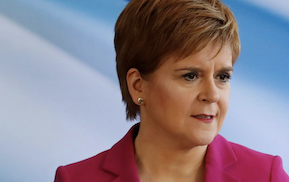Scotland’s First Minister Nicola Sturgeon was in Brussels on Monday for a series of engagements talking about Scotland’s future relationship with the EU.
Speaking to an audience including EU diplomats at the European Policy Centre, she said that Scotland’s task now that membership of the EU had ended was to find a voice as an independent nation which could take its place on the world stage.
She said that in the meantime, the Scottish Government will use its devolved powers to maintain ties with the EU, while working towards independence.
The First Minister met EU chief negotiator Michel Barnier to discuss the UK-EU talks, which are due to begin next month.
She also spoke to EU Executive Vice President Margrethe Vestager about the EU’s Green Deal and the COP26 climate change conference in Glasgow, the dynamics of digitisation and Artificial Intelligence.
Sturgeon said: “It was already clear, and it has been reaffirmed to me in the constructive meetings I’ve held today, that there is genuine goodwill in the EU towards Scotland.
“We are leaving the EU at a time when we have never benefited from it more, and when we have never needed it more to achieve our ambitions.
“On this visit to Brussels I have made clear how important it is for Scotland to remain close to the EU.”
In an interview with Bloomberg Television in Brussels on Monday, Sturgeon also repeated the possibility of asking the law courts to decide whether the Scottish Parliament already has the power to hold a consultative referendum vote.
She said that route was not the preferred option.
“The prime minister ultimately cannot deny democracy,” Sturgeon said.
“You cannot stand in the way of the right of the people of any country to choose their own future.”
Sturgeon has been pushing for the UK Government to agree to an independence vote this year.
Sturgeon predicted that ultimately, a second referendum will be “mutually agreed” with the UK government in Westminster.
She said Scotland can’t risk going down the same route of Catalonia, which held a vote that was ruled as illegal and not internationally recognized.
